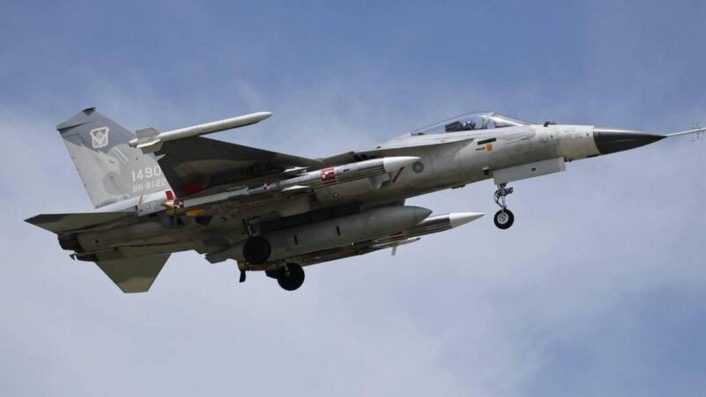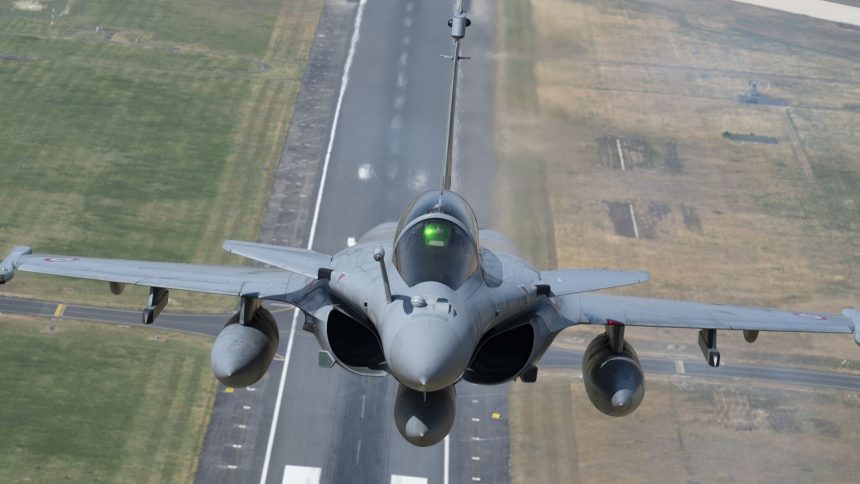In a recent hearing, Dassault Aviation’s CEO Éric Trappier told lawmakers about efforts to support Taiwan’s fleet of Mirage 2000s and their interest in the Rafale.
Dassault Aviation’s CEO Éric Trappier has suggested Taiwan is interested in the Rafale fighter, but the decision to sell the system to Taipei would be a political and diplomatic prerogative. The company’s role would be merely in the industrial, commercial domain, stemming from what the French leadership decides.
Appearing before the Economic Affairs committee of the French National Assembly on Sep. 24, 2025, Trappier was responding to a question by MP Marie-Noëlle Battistel, who queried about the issues in the maintenance and supply of parts for the RoCAF’s (Republic of China Air Force) old Mirage 2000 jets. Battistel is the president of the Taiwan Friendship Group.
Trappier responded by explaining the industrial difficulties being faced both by France and the Mirage 2000’s other international users after the jet ceased production and is set to be replaced by the Rafale F4. He then directly addressed Battistel saying she was aware Taiwan wants the Rafale, but that the call is not in his hands.
Trappier’s response makes it clear that the Taiwanese interest in the Rafale may have been made unofficially, obviously to avoid dragging Paris into a diplomatic acrimony with the PRC (People’s Republic of China).
✈️🇹🇼 Lors d’une audition à la commission des affaires économiques de l’@AssembleeNat ionale, le PDG de @Dassault_OnAir Aviation Eric Trappier révèle que Taïwan qui possède déjà des Mirage 2000-5, veut des #Rafale https://t.co/aqGjrpvqtb
— Philippe Top-Action (@top_force) September 27, 2025
Taiwan wants Rafale, but the government decides whether to sell
Battistel pointed to Trappier that during her last visit to Taiwan in her capacity as the Chair of the Taiwan Friendship Group in France, she “gathered the concerns of both the government and the military about the operational maintenance of their Mirage 2000 delivered in 1992.” This visit was on Jun. 12, 2025, where the French delegation met President Lai Ching-te.
The President thanked the French National Assembly’s contribution in making France the “first major country in the world to enact legislation to uphold freedom of navigation in the Taiwan Strait,” according to a release by his office.
Battistel then asked Trappier to comment on the steps taken by Dassault Aviation to “facilitate access to spare parts necessary for maintenance, which are delivered for some in extremely long delays, up to two years.” She also asked “Are they essentially linked to political and diplomatic issues or are there technical considerations?”, a machine translation of the audio said.
130 Aviateurs déployés en Corse pour 15 jours de campagne de tir ! Objectif : se (re)qualifier au tir canon pour 14 pilotes de #Rafale de la 30e escadre de chasse et former les jeunes “pétafs” aux procédures de maintenance spécifique à ce type d’entraînement. pic.twitter.com/aUcdZHdr3W
— Armée de l’Air et de l’Espace (@Armee_de_lair) September 12, 2025
This is a shortened version of Trappier’s response, where he eventually referenced the Rafale:
“First of all, the Mirage 2000 is at the end of its life. It’s still flying a little in France, but it’s going to stop. It’s also true of all our export customers who are going from the Mirage 2000 to the Rafale. So it’s true that the industrial dynamics of spare parts, repairs is a little bit […] harder than before […] but we are perfectly supporting Taiwan […] very well. And you know very well what the Taiwanese want. They want Rafale. It doesn’t depend on me. It’s not my responsibility. It’s the government’s.”
This suggests that the Taiwanese have informally, possibly over the years, conveyed their interest in the Rafale, both to Dassault executives in commercial talks when sourcing spares, and to French lawmakers. Combat pilots and aerospace experts would agree that the recent face-off between the Indian and Pakistani air forces, albeit amid Chinese propaganda about the superiority of their J-10Cs to the Rafale, does not discredit the latter. Outcomes of aerial combat depend on a lot of tactical, logistical, planning and support infrastructure resources.
A fantastic view of a ROCAF Dassault Mirage 2000-5DI dual-seater coming in for a landing. Taipei is in talks with Dassault to modernize and extend the service life of its aging Mirage fleet. Alongside F-16s and F-CK-1s, the Mirages form the backbone of Taiwan’s fighter force. pic.twitter.com/54x7kpIali
— Air Power (@RealAirPower1) June 29, 2025
The ultimate decision of selling the Rafale to Taiwan would lie with the Elysee Palace, and its own equations with the White House. The two have frequently diverged on many geopolitical issues, including over Russia and Ukraine.
China meanwhile opposes any international military, diplomatic engagement with Taiwan. This includes the one with the United States, which is now Taipei’s only foreign military supplier. Nations balance their trade and investment ties with Beijing, with France and China particularly having robust diplomatic relations.
RoCAF’s current fleet
According to Taiwan News, Taiwan bought 60 Dassault Mirage 2000-5 jets from France since the 1990s, and currently operates 54 airframes, after losing six to accidents. The RoCAF’s other fighter fleet consists of 139 F-16A/B Block 20 Mid-Life Update (MLU) jets, which were converted to the F-16V Viper standard. The F-16V Viper is the designation assigned to older F-16 jets modernized to the Block 70 standard.
Happy #FighterFriday to our amazing F-16V fighter aircraft in #ROCAF#4thTacticalFighterWing pic.twitter.com/xG3CrxhPtY
— 國防部 Ministry of National Defense, ROC(Taiwan) 🇹🇼 (@MoNDefense) August 2, 2024
It is also set to receive 66 newly built F-16C/D Block 70s, part of a 2019 $8 billion deal, the first of which was unveiled in a ceremony at Lockheed Martin’s facility in Greensville in South Carolina on Mar. 28, 2025. Taiwan also operates 129 of the homegrown AIDC F-CK-1 Ching-kuo IDF (Indigenous Defense Fighter) in the ‘C’ and ‘D’ variants.

As for special mission and support aircraft, Taiwan reached out to France and the U.S. for acquiring aerial refueling tankers and AEW&C (Airborne Early Warning and Control) aircraft. The RoCAF’s current AEW&C fleet consists of five E-2Ks, the Taiwanese variant of the E-2C Hawkeye, out of an original fleet of six. L3Harris also displayed a scale mode of its CAEW (Conformal Airborne Early Warning)-type aircraft concept, based on the Bombardier Global 6500 jet, at the TADTE 2025 exhibition in Taiwan.









